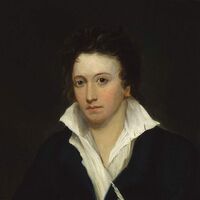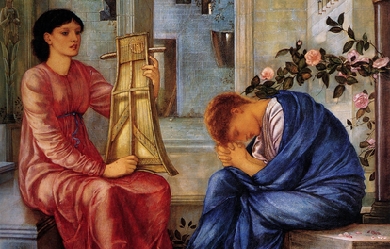Fiordispina
The season was the childhood of sweet June,
Whose sunny hours from morning until noon
Went creeping through the day with silent feet,
Each with its load of pleasure; slow yet sweet;
Like the long years of blest Eternity
Never to be developed. Joy to thee,
Fiordispina and thy Cosimo,
For thou the wonders of the depth canst know
Of this unfathomable flood of hours,
Sparkling beneath the heaven which embowers—
...
They were two cousins, almost like to twins,
Except that from the catalogue of sins
Nature had rased their love—which could not be
But by dissevering their nativity.
And so they grew together like two flowers
Upon one stem, which the same beams and showers
Lull or awaken in their purple prime,
Which the same hand will gather—the same clime
Shake with decay. This fair day smiles to see
All those who love—and who e’er loved like thee,
Fiordispina? Scarcely Cosimo,
Within whose bosom and whose brain now glow
The ardours of a vision which obscure
The very idol of its portraiture.
He faints, dissolved into a sea of love;
But thou art as a planet sphered above;
But thou art Love itself—ruling the motion
Of his subjected spirit: such emotion
Must end in sin and sorrow, if sweet May
Had not brought forth this morn—your wedding-day.
...
‘Lie there; sleep awhile in your own dew,
Ye faint-eyed children of the... Hours,’
Fiordispina said, and threw the flowers
Which she had from the breathing—
...
A table near of polished porphyry.
They seemed to wear a beauty from the eye
That looked on them—a fragrance from the touch
Whose warmth... checked their life; a light such
As sleepers wear, lulled by the voice they love, which did reprove
The childish pity that she felt for them,
And a... remorse that from their stem
She had divided such fair shapes... made
A feeling in the... which was a shade
Of gentle beauty on the flowers: there lay
All gems that make the earth’s dark bosom gay.
... rods of myrtle-buds and lemon-blooms,
And that leaf tinted lightly which assumes
The livery of unremembered snow—
Violets whose eyes have drunk—
...
Fiordispina and her nurse are now
Upon the steps of the high portico,
Under the withered arm of Media
She flings her glowing arm
...
... step by step and stair by stair,
That withered woman, gray and white and brown—
More like a trunk by lichens overgrown
Than anything which once could have been human.
And ever as she goes the palsied woman
...
‘How slow and painfully you seem to walk,
Poor Media! you tire yourself with talk.’
‘And well it may,
Fiordispina, dearest—well-a-day!
You are hastening to a marriage-bed;
I to the grave!’—‘And if my love were dead,
Unless my heart deceives me, I would lie
Beside him in my shroud as willingly
As now in the gay night-dress Lilla wrought.’
‘Fie, child! Let that unseasonable thought
Not be remembered till it snows in June;
Such fancies are a music out of tune
With the sweet dance your heart must keep to-night.
What! would you take all beauty and delight
Back to the Paradise from which you sprung,
And leave to grosser mortals?—
And say, sweet lamb, would you not learn the sweet
And subtle mystery by which spirits meet?
Who knows whether the loving game is played,
When, once of mortal [vesture] disarrayed,
The naked soul goes wandering here and there
Through the wide deserts of Elysian air?
The violet dies not till it’—



